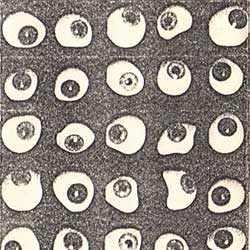Published by Alessandro Violante on May 16, 2016
 Imagine, just for a moment, to be two passionate Italian industrial music musicians living in the ’80s, during the tape scene, and to be interested in its potentialities. You’ll feel like Giancarlo and Roberto Drago, known as The Tapes, active since the early ’80s until the early ’90s and unfortunately forgotten until some time ago. Then, Ecstatic label released a sort of best of, and later on a young (but very promising) Swiss label, Luce Sia, decided to republish on tape their 1988’s release Glasaugen (“glass eyes”),which is analyzed here.
Imagine, just for a moment, to be two passionate Italian industrial music musicians living in the ’80s, during the tape scene, and to be interested in its potentialities. You’ll feel like Giancarlo and Roberto Drago, known as The Tapes, active since the early ’80s until the early ’90s and unfortunately forgotten until some time ago. Then, Ecstatic label released a sort of best of, and later on a young (but very promising) Swiss label, Luce Sia, decided to republish on tape their 1988’s release Glasaugen (“glass eyes”),which is analyzed here.
The Tapes belong, conceptually and temporarily, to a generation of industrial musicians who made music when its expressive potentialities still had to be discovered, with boundaries less rigid than now, above all in Italy. As far as cultural and musical influences are concerned, we have to think about the lesson of Throbbing Gristle, J.G. Ballard and William Burroughs. Then don’t feel astonished if in Glausagen you’ll find clearly experimental industrial music and, at the same time, a song as The day of silence, that could be labeled as instrumental minimalist wave music characterized by an obsessive repetition. The beauty and the peculiar aspect of the songs contained in this tape is (if the listener wants to find them) in the will to give shape to new ideas without worrying about the formal perfection of the result, as well as in the eccentricity of the solutions sometimes used. It’s not infrequent to think about some early twentieth century avantgarde music while listening to the piano improvisation moments contained in Metamorfosi, in Burning cars and, in a lesser extent, Il Manifesto. Listening to it today these details, plus certain imprecisions whose meaning have to be searched in the live recording sessions that the duo used for the album, make Glausagen a rather interesting and out-of-bounds work instead of a set of not original retrò numbers.
Lots of ideas, and many ways to transform them in something real: for example Slowly is a slow instrumental song that could be composed by Lou Reed, while The wait is closer to some classic “experimental-minimalist” music than to modern industrial music. Here the sounds perfectly highlight the anguished state typical of a long wait, and The Tapes intuition in converting this kind of sensation in music isn’t ordinary. The drop is cinematographic, a song which sounds recall those produced by the fly of birds, while the slow and decadent Burning cars plays with vocal modulation to study its possibilities. Also here there’s a short piano improvisation that highlights the taste for the “new”.
The Tapes music and, in particular, that contained in Glasaugen, is worthy of being rediscovered for a set of reasons: the first one is that they are one of the most interesting old Italian projects among ’80s minimalist music, their early industrial influences and avantgarde heritage. The second one is that the present can’t be fully understood if not by studying the past. These two reasons are more than enough to justify a deep listening session for an atypical work, which presents a duo whose sound hasn’t ever found a precise musical collocation. That’s a different situation from that we find in the tape that Luce Sia rereleased some months ago, a work from RD (Roberto Drago), in which the genre boundaries are undoubtfully more present.
Rating: 8
Label: Luce Sia


